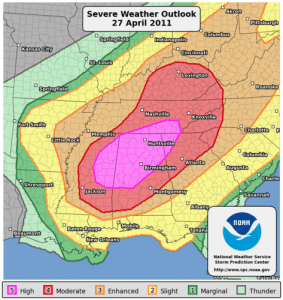The National Weather Service Storm Prediction Center said Monday it will add two threat levels to its weather outlooks so people aren’t surprised by really bad storms on days with just a “slight risk” of tornadoes, hail or high winds.

Beginning Oct. 22, forecasters can say whether slight risk days are “enhanced” or “marginal” or just plain “slight.” Other categories remain, including “high” and “moderate.”
The Norman, Oklahoma-based center traditionally targeted local forecasters and broadcasters across the U.S. with their advisories, known as “convective outlooks,” but the Internet makes that data available to anyone with a computer and basic scientific knowledge.
“We serve a very diverse group,” said Greg Carbin, the center’s warning coordination meteorologist. “We have a hybrid audience of highly sophisticated decision-makers,” ranging from “expert users of weather information” to “the head of the household in those parts of the country that are often targeted by severe weather.”
The Storm Prediction Center for years classified the risk as high, moderate or slight, “and you can have killer storms in a slight risk,” Carbin said.
The system now mimics scales for tornado damage, hurricane strength and the former Homeland Security terrorist threat sale.
“It gets us to five categories. Now we have a scheme where we can rank something 1-5,” Carbin said.
A public comment period drew 700 responses, mostly from individuals, government officials and the media. Around two-thirds said they used the outlooks at least once daily, and 87 percent of them said they liked the idea. Some, however, said extra colors made the map confusing.
Carbin said television broadcasters didn’t like the term “slight risk,” fearing viewers often interpret that as “no risk.” He said they were free to develop their own terms.
“I don’t care if you use ‘slight’ or ‘a 2-out-of-5 chance,’ as long as the general understanding of risk is conveyed,” he said.
Related Articles:
Improved Long Term Forecasts at Heart of National Hurricane Center’s Goals
Was this article valuable?
Here are more articles you may enjoy.

 LA County Told to Pause $4B in Abuse Payouts as DA Probes Fraud Claims
LA County Told to Pause $4B in Abuse Payouts as DA Probes Fraud Claims  China Bans Hidden Car Door Handles in World-First Safety Policy
China Bans Hidden Car Door Handles in World-First Safety Policy  Canceled FEMA Review Council Vote Leaves Flood Insurance Reforms in Limbo
Canceled FEMA Review Council Vote Leaves Flood Insurance Reforms in Limbo  FM Using AI to Elevate Claims to Deliver More Than Just Cost Savings
FM Using AI to Elevate Claims to Deliver More Than Just Cost Savings 